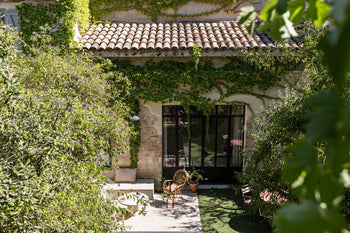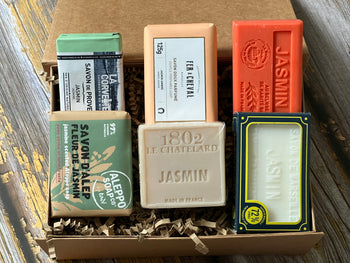
Gifting couldn't be easier
Add a gift message to be emailed to when their parcel arrives, or at a time of your choice.
Bay Laurel and Olive Oil have for centuries been saponified according to Marseille tradition resulting in a green paste. This is poured onto the ground and when set, is cut into cubes and stacked into columns to be air dried. When fully matured the soap has a rust brown crust, a hard exterior that hides a softer olive green interior. The resulting Aleppo soap is natural and mild, using the minimum number of ingredients. Available in a traditional bar, liquid soaps and shampoo. No parabens, no preservatives, no colourings, no fragrances - just pure, mild and natural soap.
Laurel oil, also known as bay laurel oil or Laurus nobilis oil, is one of the oldest and most revered botanical extracts used in skincare and soapmaking. It carries with it a rich legacy stretching from the ancient Mediterranean to the present day, particularly in the famed Aleppo soap tradition of Syria. In recent years, as skincare has become more scientific and 'manufactured' laurel oil has also re-emerged in natural skincare, valued for its antibacterial, antifungal, and anti-inflammatory properties.
This article explores the origins, benefits, concerns, and modern applications of laurel oil—along with usage recommendations for body care lovers and artisan soap connoisseurs.
Laurel oil is extracted from the berries (and sometimes leaves) of the Laurus nobilis plant—commonly known as bay laurel, native to the Mediterranean. The same plant gives us bay leaves, widely used in cooking, but the oil is obtained through steam distillation or cold pressing of the small black fruits.
It should not be confused with West Indian bay oil (from Pimenta racemosa), which is used in hair tonics and colognes. True Laurus nobilis oil is thicker, greenish, and powerfully aromatic.
The use of laurel oil dates back thousands of years to ancient Greece and Rome, where laurel wreaths symbolised victory and divine favour. The plant was considered sacred to Apollo, god of healing and prophecy.
In Syria, especially the city of Aleppo, laurel oil became a prized ingredient in one of the world’s oldest soaps. For centuries, Aleppo soap has been handcrafted from just olive oil, laurel oil, water, and lye, 'aged' for months to create a gentle yet effective cleanser.
This soap making tradition laid the groundwork for Savon de Marseille and Castille soap, which later adopted olive oil as its primary base as laurel oil was difficult to source locally in France and Spain.
Laurel oil is prized for its multi-functional therapeutic properties, especially in skincare and scalp treatments.
Laurel oil has strong natural antimicrobial properties, making it beneficial for:
Acne-prone skin
Dandruff and itchy scalp
Fungal infections (e.g. athlete’s foot)
Minor wounds or skin irritations
Rich in eugenol and cineole, laurel oil calms inflammation, which can help conditions like:
Eczema
Psoriasis
Redness and irritation
When blended with olive oil or shea butter, laurel oil helps soothe and restore the skin barrier, particularly useful for:
Dry or chapped skin
Winter skincare routines
Hands damaged by frequent washing
Its complex herbal fragrance—spicy, woody, and slightly medicinal—has mood-enhancing and respiratory-clearing effects when used in:
Aromatherapy blends
Soap and shower steamers
Herbal balms or massage oils
Laurel oil is the unique and hero ingredient in Aleppo soap—a centuries-old tradition that remains unrivalled for it's ability to support the most challenging of skins with gentleness and purity. This soap is typically made with olive oil (as the base) and 2% to 40% laurel oil, depending on the formulation.

Low-irritant: Gentle enough for face and baby care
Natural antiseptic: Helps with skin concerns like acne or dermatitis
Aged over months: The soap becomes milder and longer-lasting
Eco-friendly: 100% natural and biodegradable
The higher the percentage of laurel oil, the more medicinal and fragrant the soap—though even 5–10% can provide excellent benefits without overwhelming the skin.
While laurel oil is generally safe in diluted or soap-based forms, there are a few considerations:
Laurel oil is potent and should not be applied neat (undiluted) to the skin.
Always perform a patch test if you have sensitive skin.
Laurel Oil is mostly extracted via a cold process which ensures it suitable for the most demanding and troubled skins. When distilled via a hot process the plant oil can react with oxygen and casue some irriation foparticularly sensitive skins.
Not all laurel oils are equal. Some commercial "bay oils" may be adulterated or confused with other species. Look for:
Laurus nobilis botanical name
Organic or wild-harvested sources
Transparent labeling of percentage used
While laurel oil is not traditionally used in Savon de Marseille, some artisan soap makers in Provence and across Europe are rediscovering its value—blending laurel with olive oil to create modern versions of Aleppo-style soap.
In Provence, where aromatherapy and natural wellness are part of daily life, laurel oil is used in:
Solid and liquid soaps
Herbal salves and balms
Deodorants and bath oils
Small savonneries (soap workshops) often craft laurel oil soaps in small batches, curing them for months to maximize their effectiveness and purity.
Whether you're using a laurel-infused soap or exploring the oil in your own blends, here are a few recommendations:
Choose Aleppo soap with 5–20% laurel oil for daily use
Use higher-percentage bars (30–40%) for targeted conditions like acne, eczema, or scalp issues
Ideal for face, body, and even shaving
Use diluted (1–2% in a carrier oil like olive or jojoba)
Apply as a spot treatment for blemishes or fungal issues
Avoid use around eyes or mucous membranes
Add to scalp massage oils or anti-dandruff treatments
Combine with rosemary or tea tree oil for oily scalps
Authentic Aleppo soap
Certified organic or wildcrafted laurel oil
Products with a clear percentage of laurel oil listed
Handmade or traditionally crafted soaps
Avoid overly perfumed versions or soap labeled “laurel” with fragrance substitutes—true laurel oil has a strong herbal scent and distinctive green hue.
We've focused very much on the use of Aleppo soap for yourself and your family so far.
Syrian Aleppo Soap, like Savon de Marseille, is multi-purpose and also suited to household cleaning. Our range at French Soaps in the UK includes
Laurel oil is one of nature’s most remarkable gifts—blending antibacterial power, aromatic depth, and skincare gentleness. Its legendary status in Aleppo soap and connection to Mediterranean herbal wisdom make it a powerful ingredient for anyone seeking natural, effective, and heritage-based beauty.
Whether you're exploring laurel oil soaps, adding it to your body care rituals, or just learning about its ancient role in wellness, it's worth a place in your skincare routine—especially when paired with traditional oils like olive, coconut, or shea.
©️ French Soaps UK 2025
If you'd like help shopping this article, or have more product and ingredient questions
E. bonjour@frenchsoaps.co.uk or
T. 01423 803080
Telephone or Whats App: 01423 803080
Email: bonjour@frenchsoaps.co.uk
Social: @FrenchsoapsUK
Address: Unit 14 Ousegill Business Park, Carr Side Road, Great Ouseburn, North Yorkshire, YO26 9AE
Sign up for our newsletter and get all the latest news, offers and more delivered straight to your inbox. You can unsubscribe at any time. By 'submitting' you are agreeing to our T&C's and Privacy Policy.
Gifting couldn't be easier
Add a gift message to be emailed to when their parcel arrives, or at a time of your choice.



